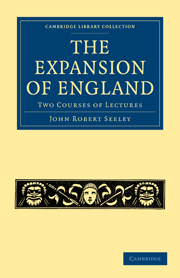Book contents
- Frontmatter
- PREFACE
- Contents
- COURSE I
- LECTURE I TENDENCY IN ENGLISH HISTORY
- LECTURE II ENGLAND IN THE EIGHTEENTH CENTURY
- LECTURE III THE EMPIRE
- LECTURE IV THE OLD COLONIAL SYSTEM
- LECTURE V EFFECT OF THE NEW WORLD ON THE OLD
- LECTURE VI COMMERCE AND WAR
- LECTURE VII PHASES OF EXPANSION
- LECTURE VIII SCHISM IN GREATER BRITAIN
- COURSE II
LECTURE IV - THE OLD COLONIAL SYSTEM
Published online by Cambridge University Press: 05 August 2011
- Frontmatter
- PREFACE
- Contents
- COURSE I
- LECTURE I TENDENCY IN ENGLISH HISTORY
- LECTURE II ENGLAND IN THE EIGHTEENTH CENTURY
- LECTURE III THE EMPIRE
- LECTURE IV THE OLD COLONIAL SYSTEM
- LECTURE V EFFECT OF THE NEW WORLD ON THE OLD
- LECTURE VI COMMERCE AND WAR
- LECTURE VII PHASES OF EXPANSION
- LECTURE VIII SCHISM IN GREATER BRITAIN
- COURSE II
Summary
I remarked that ancient Greek colonisation, compared with the modern system, might be called in a certain sense the natural system. And yet the modern system might be represented as natural also. The Greeks regard the State as essentially small, and infer that a surplus population can only be accommodated by founding another State. But is there anything necessarily unnatural in the other view that the State is capable of indefinite growth and expansion? The ripe fruit dropping from the tree and giving rise to another tree may be natural, but so is the acorn spreading into the huge oak that has hundreds of branches and thousands of leaves. If Miletus among its daughter-cities may remind us of the one, England expanding into Greater Britain resembles the other.
And yet surely there must be something unnatural in the system against which our own colonists revolted a hundred years ago and the colonists of Spain and Portugal a few years later.
The truth is that the simple idea of expansion has seldom been conceived or realised clearly.
Let us work out a little in our minds the conception of a Greater Britain, of the English State extended indefinitely without being altered. The question is often asked, What is the good of colonies? but no such question could possibly be raised if colonies really were such a simple extension of the mother-state. Whether this extension is practicable may be questioned, but it cannot be questioned that if it were practicable it would be desirable.
- Type
- Chapter
- Information
- The Expansion of EnglandTwo Courses of Lectures, pp. 56 - 76Publisher: Cambridge University PressPrint publication year: 2010First published in: 1883



